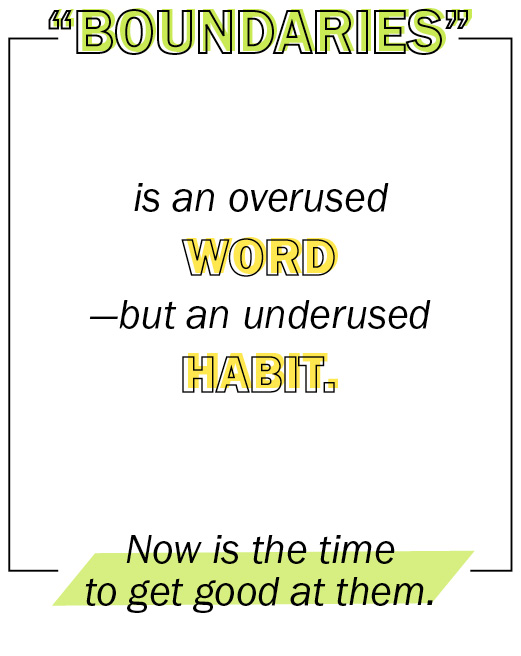
Rate this article and enter to win
Juggling full-time school and full-time life? Join the club. At the same time as handling classes, professors, and assignments, we’re dealing with parents, partners, or kids; keeping up with our friends; or meeting the needs of our coworkers—sometimes all of the above. Chances are you’re struggling to keep up your relationships and still find time for yourself, all while studying or working.
Managing school and the rest of life is “very challenging but just about manageable,” according to 48 percent of the students who responded to a recent CampusWell survey. More than a quarter of respondents felt they could have handled this stuff more effectively. Only 18 percent said it hadn’t been a problem.
How boundaries can improve relationships
How can we minimize these frustrations and stay connected with the important people in our lives? “Boundaries” is an overused word—but an underused habit. Now is the time to get good at them. Setting boundaries, both for ourselves and others, has multiple benefits:
- More effective time management
- Stronger personal connections
- Less guilt
There are long-term gains, too. “This is an investment in your future professional life,” says Lisa Kleitz, a leadership development and career management consultant in Boston, Massachusetts. “Communicating about boundaries is good practice for similar challenges in the workplace.”
Stick to your boundaries

Communicate with yourself
“This is primary. If you’re clear with yourself, you can be clear with others,” says Kleitz. Remind yourself daily of your goals, including your future career, and the importance of staying healthy for yourself and your family. Acknowledge your own limits.
Keep others in the loop
Share your schedule. Use a whiteboard to let your family/roommates know what you’re up to each day. Remember, too, that communication doesn’t just happen at home. Discuss personal constraints with an advisor or mentor.
Practice self-care
“Schedule non-school events and make it mandatory. For example, I have activities with friends planned every day after school, such as yoga, climbing, or mountain biking. I work harder during school hours to get my homework and assignments done,” says Lori M., a fifth-year undergraduate at the Metropolitan State University of Denver in Colorado.
The art of “no”
As important as it is to nurture your relationships, blocking off down time for yourself is just as essential. For a positive way to decline a request or invitation, use the “Yes… and…” strategy, says Kleitz. For example, “Yes, I wish I could help you with that project, and my calendar is full,” or “Yes, that sounds really important, and I have other commitments that day.” Or try a counteroffer. Friends want you to go out on a weeknight? “Can’t make it work, but maybe we can hike this weekend, or combine our errands and catch up?”
Be honest and open
“The guilt that may come from other people’s demands is best handled by a firm sense of self and honesty about your priorities and decisions,” says Dr. Aaron Goodson, assistant director of counseling and sport psychology at Mississippi State University. “Inevitably, there will be growth and change. Everyone involved with the student should know and understand that.”
Quality > quantity
Make arrangements to spend dedicated time with the people who mean the most to you, like partners, spouses, close friends, children, parents, and siblings—even if you can only do so once a month or during school breaks. For others, small gestures (an email or card) are effective. Snail mail can feel more meaningful when you’ve recently moved away. Set up automatic reminders for upcoming events, birthdays, and anniversaries.
Ask for help
“We don’t naturally ask for help when we need it,” says Kleitz. “Understand that asking for help is good practice for someone who has a lot on their plate.”
Remember, less is more
“You’re juggling school, extracurriculars, maybe a job, and then you add in family obligations, and it’s a lot to handle,” says Dr. Damien Clement, associate professor of sport psychology and assistant dean at West Virginia University in Morgantown. “When you start dropping things, that’s an indication that you’re doing too much. You always have a choice.”
How do other students find balance?
“Time management. Focus on creating a schedule and sticking to it,” says Kelly J., a third-year student at Dakota State University in Madison, South Dakota. “Also, make sure you put in time for relaxing. This makes working when you need to easier.”
“Make sure you prioritize your personal safety and health above school. It can be easy to get wrapped up in it and forget to take care of yourself,” suggests Tori A., a second-year undergraduate at College of St. Scholastica in Duluth, Minnesota.
If you’re feeling overwhelmed, don’t hesitate to reach out to someone at your campus counseling center. Counselors can talk you through academic and personal issues—no matter how big or small—and can help you deal with the anxiety and stress that often go hand-in-hand with being a student.
10 ways to build and preserve better boundaries: PsychCentral
Students’ perspectives on juggling work, family, and college: MDRC
How to set boundaries in friendships: Thrive Global
How to set boundaries with your family, according to a life coach: Bustle
Returning to school as an adult: Minnesota State
Damien Clement, PhD, associate professor of sport and exercise psychology, and assistant dean, West Virginia University, Morgantown.
Aaron Goodson, PhD, assistant director of counseling and sport psychology, Mississippi State University, Starkville.
Lisa Kleitz, CPCC, PCC, leadership development and career management consultant, Inner Assets, Boston, Massachusetts.
CampusWell survey, August 2019.


























